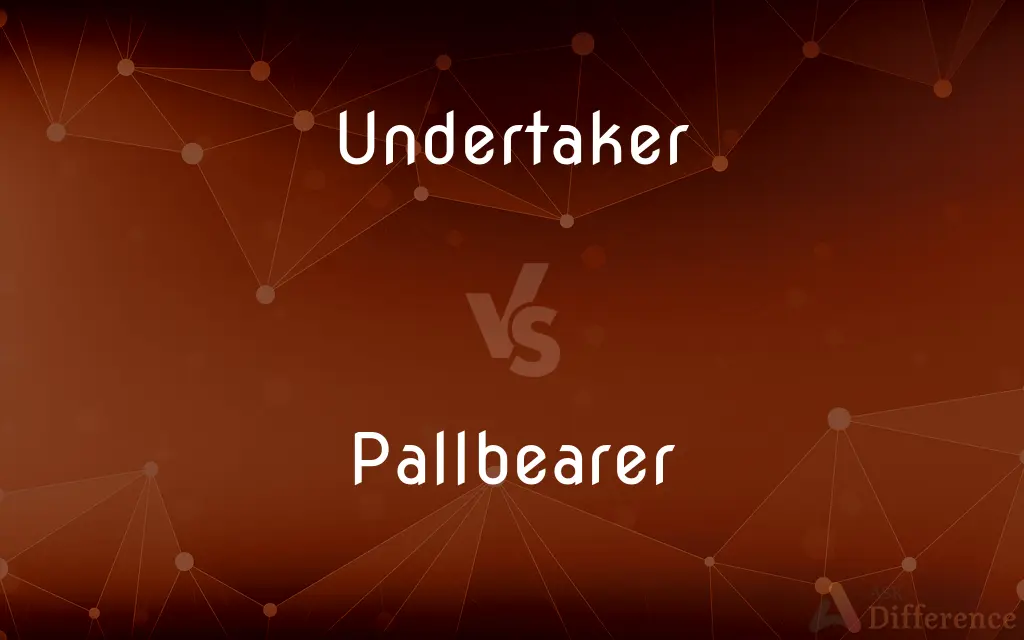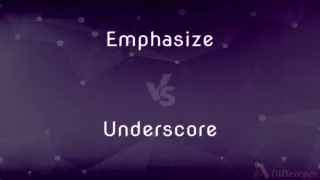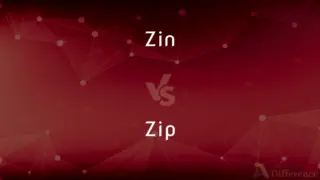Undertaker vs. Pallbearer — What's the Difference?
Edited by Tayyaba Rehman — By Urooj Arif — Updated on April 9, 2024
An Undertaker manages funeral arrangements and services, focusing on logistics and legalities; a Pallbearer physically carries the coffin, symbolizing their support for the deceased's family.

Difference Between Undertaker and Pallbearer
Table of Contents
ADVERTISEMENT
Key Differences
An Undertaker, also known as a funeral director, plays a pivotal role in planning and executing the logistical and legal aspects of a funeral. They ensure that the ceremony aligns with the family's wishes and complies with local regulations. In contrast, a Pallbearer has a more symbolic role, physically carrying or escorting the coffin during the funeral service to show respect and support for the deceased and their family.
Undertakers often have formal education in mortuary science, which equips them with the knowledge to handle the deceased's body respectfully and safely, including embalming and cremation. Pallbearers, on the other hand, are usually close friends or family members of the deceased, selected for their emotional connection rather than professional qualifications.
While undertakers manage the behind-the-scenes aspects of a funeral, including paperwork and coordination with cemeteries and crematoriums, pallbearers have a visible presence during the ceremony. Their role is ceremonial, helping to guide the deceased to their final resting place.
Undertakers may also provide emotional support and guidance to grieving families, offering resources for grief counseling and helping with funeral planning. Conversely, pallbearers contribute to the emotional support network in a more personal and intimate manner, through their physical participation in the ceremony.
An undertaker's responsibilities extend beyond the funeral service, including aftercare and assisting families with memorial services or handling the deceased's belongings. Pallbearers, however, typically fulfill their role on the day of the funeral, with no obligations concerning the planning or aftermath of the service.
ADVERTISEMENT
Comparison Chart
Role
Manages and directs funeral services and logistics.
Carries or escorts the coffin during the funeral.
Qualifications
Professional training in mortuary science.
Emotional connection to the deceased; no formal qualifications.
Main Responsibility
Ensuring the funeral service complies with legal and personal wishes.
Symbolizing support for the deceased’s family through their role.
Visibility
Behind-the-scenes coordination and support.
Visible during the funeral service; ceremonial presence.
Post-Service Role
Assists with aftercare and additional services.
Typically no role beyond the funeral ceremony.
Compare with Definitions
Undertaker
A provider of funeral goods and services.
The undertaker offered a selection of caskets and urns.
Pallbearer
A person selected to symbolize their support to the family of the deceased.
As a close friend of the family, she was asked to be a pallbearer.
Undertaker
A counselor for grieving families.
The undertaker provided guidance on coping with loss.
Pallbearer
A bearer of the coffin, chosen for their emotional connection.
Pallbearers were chosen from among his lifelong friends.
Undertaker
A professional who arranges and conducts funerals.
The undertaker ensured the funeral service was respectful and ran smoothly.
Pallbearer
Someone who plays a ceremonial role in a funeral.
The pallbearers walked slowly, marking the solemnity of the occasion.
Undertaker
A manager of funeral logistics.
The undertaker coordinated the burial with the cemetery.
Pallbearer
An individual who helps carry a coffin at a funeral.
He was honored to be a pallbearer at his grandfather's funeral.
Undertaker
Someone licensed to embalm and bury the dead.
The undertaker took care of all the necessary legal paperwork.
Pallbearer
A participant in the funeral service, showing respect to the deceased.
Pallbearers carried the coffin to its final resting place with dignity.
Undertaker
See funeral director.
Pallbearer
A pallbearer is one of several participants who help carry the casket at a funeral. They may wear white gloves in order to prevent damaging the casket and to show respect to the deceased person.
Undertaker
(ŭn′dər-tākər) One who undertakes a task or job.
Pallbearer
One of the persons carrying or attending a coffin at a funeral.
Undertaker
A funeral director; someone whose business is to manage funerals, burials and cremations.
Pallbearer
(archaic) One who carries a corner of the pall over a coffin or casket.
Undertaker
(historical) A person receiving land in Ireland during the Elizabethan era, so named because they gave an undertaking to abide by several conditions regarding marriage, to be loyal to the crown, and to use English as their spoken language.
Pallbearer
One called upon to carry or bear the casket at a funeral.
Undertaker
(historical) A contractor for the royal revenue in England, one of those who undertook to manage the House of Commons for the king in the Addled Parliament of 1614.
Pallbearer
One of those who attend the coffin at a funeral; - so called from the pall being formerly carried by them.
Undertaker
(rare) One who undertakes or commits to doing something.
Pallbearer
One of the mourners carrying the coffin at a funeral
Undertaker
One who undertakes; one who engages in any project or business.
Undertaker
One who stipulates or covenants to perform any work for another; a contractor.
To sign deputations for undertakes to furnish their proportions of saltpeter.
In come some other undertakes, and promise us the same or greater wonders.
Undertaker
Specifically, one who takes the charge and management of funerals.
Undertaker
One whose business is the management of funerals
Common Curiosities
Who can be a pallbearer?
A pallbearer is typically a close friend or family member of the deceased, selected for their emotional bond.
Can women be pallbearers?
Yes, women can be pallbearers, as the role is determined by emotional significance, not gender.
Do pallbearers need any special training?
No, pallbearers do not require special training, as their role is based on emotional connection and respect.
What does an undertaker do?
An undertaker manages funeral arrangements, including legalities and logistics, to ensure a respectful service.
Is an undertaker the same as a funeral director?
Yes, an undertaker and a funeral director refer to the same profession, focusing on funeral management.
Can anyone become an undertaker?
Becoming an undertaker requires specific education, training, and licensing, making it a profession not everyone can pursue without the necessary qualifications.
What qualifications do undertakers need?
Undertakers typically need formal education in mortuary science and a license to practice.
Do pallbearers carry the coffin the entire time?
Pallbearers may carry the coffin to and from the hearse, and to the gravesite, but it varies by funeral.
How are pallbearers selected?
Pallbearers are chosen by the deceased's family, often for their close relationship with the deceased.
What is the main difference between an undertaker and a pallbearer?
The main difference lies in their roles: undertakers manage the funeral's logistical and legal aspects, while pallbearers provide a ceremonial and supportive presence.
How do families choose an undertaker?
Families may choose an undertaker based on reputation, services offered, or personal recommendations.
What services do undertakers provide?
Undertakers offer a range of services, including embalming, arranging the funeral service, and providing grief support.
Can an undertaker also be a pallbearer?
While uncommon, an undertaker can be a pallbearer if they have a close personal relationship with the deceased.
How many pallbearers are usually needed?
The number of pallbearers can vary, typically ranging from four to eight, depending on the coffin's size.
Is being a pallbearer considered an honor?
Yes, being selected as a pallbearer is often considered an honor, as it signifies a close bond with the deceased or their family.
Share Your Discovery

Previous Comparison
Emphasize vs. Underscore
Next Comparison
Zin vs. ZipAuthor Spotlight
Written by
Urooj ArifUrooj is a skilled content writer at Ask Difference, known for her exceptional ability to simplify complex topics into engaging and informative content. With a passion for research and a flair for clear, concise writing, she consistently delivers articles that resonate with our diverse audience.
Edited by
Tayyaba RehmanTayyaba Rehman is a distinguished writer, currently serving as a primary contributor to askdifference.com. As a researcher in semantics and etymology, Tayyaba's passion for the complexity of languages and their distinctions has found a perfect home on the platform. Tayyaba delves into the intricacies of language, distinguishing between commonly confused words and phrases, thereby providing clarity for readers worldwide.















































